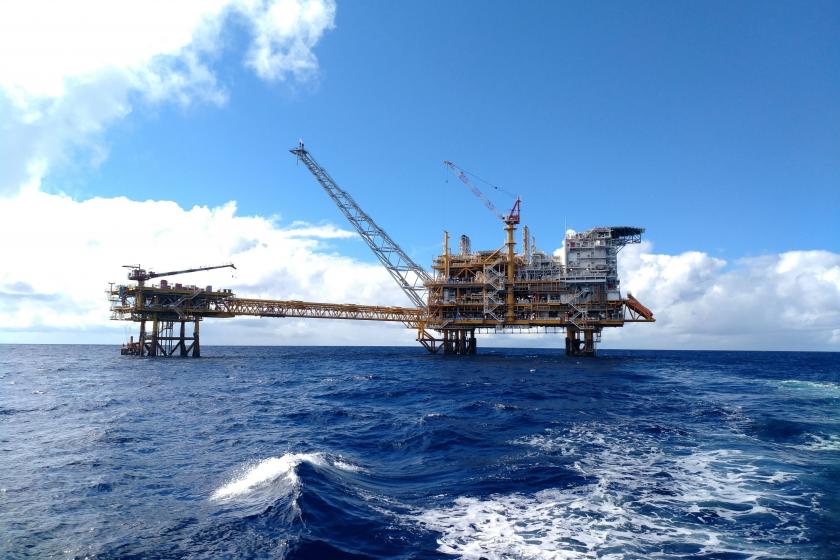Chris Sidoti speaks to Myanmar Now
International sanctions on MOGE increasingly likely, says legal expert
Myanmar Now
June 28
Five months after the military seized power in Myanmar, hundreds of millions of dollars in revenues from natural gas projects still flow to the military regime.
Calls are growing for foreign governments, notably the United States, to impose sanctions that could prevent the regime from controlling revenue from gas production.
Today, most gas revenues flow into accounts held outside Myanmar by state-owned banks which, like all other public institutions, are now in the hands of the military.
In effect, the gas revenues go into a black hole controlled by the generals.
If sanctions were imposed on gas revenues, the effect on the regime’s finances would be significant.
Myanmar was expected to earn 2,305 billion kyat (about US$1.5 billion) from oil and gas in 2020/21, according to an official forecast from before the coup.
This would be about 10 per cent of the government’s forecast revenues. The gas revenue is a vital source of hard currency which the regime needs to pay for imports from abroad.
To be effective, sanctions would need to override a complex set of financial and legal arrangements between Myanmar, foreign oil companies and international banks.
“The foreign currency is held offshore. It never enters Myanmar,” says Ben Hardman of Earthrights International, a non-profit group which has been campaigning for more than twenty years against human rights abuses by the Myanmar military.
“In the past this enabled the military to use exchange rate manipulation and opaque accounting to ensure that up to ninety-nine percent of the billions that Myanmar received in gas revenues never graced the national budget,” Hardman added.
“In practice, payments from gas revenues have been followed, for example, by down-payments on Russian warplanes.”
“There is no choice”
Gas produced by foreign oil companies is mostly exported to state-owned energy companies in Thailand and China, though some is sold within Myanmar.
So far, foreign governments have imposed sanctions on members of the military regime, and on companies under military control, but not on the state-owned Myanmar Oil and Gas Enterprise (MOGE) which handles most of Myanmar’s gas revenues.
But that may change. “States are gradually (tightening) the sanctions that they’re applying,” says Australian legal expert Chris Sidoti. “I think it’s only a matter of time before MOGE gets onto the agenda.”
Sidoti was a member of a fact-finding mission, set up by the United Nations Human Rights Council in 2017, which concluded that the military had committed crimes under international law against the Rohingya people and other civilians in Myanmar.
Sidoti told Myanmar Now that the mission did not recommend sanctions against Myanmar’s gas industry because cutting off gas revenues would have made it harder for the civilian government to provide much-needed public services to Myanmar’s people, like health and education.
But Sidoti thinks the military coup has changed the situation. “You have to cut off the military’s arms supplies and its cash supplies. If what [gas revenues] are doing is strengthening the military’s repression, then there is no choice. It’s the people of Myanmar who are demanding action.”
Any sanctions would most likely be led by the United States, where a bipartisan group of senators have called on the Biden government to take action against MOGE.
The New York Times has reported that powerful US oil company Chevron is lobbying the US State Department and key Congressional offices against imposing sanctions which would affect its profitable investment in the Yadana gas project.
Total of France (now renamed TotalEnergies) has said it will comply with any international sanctions but has urged caution on foreign governments in applying them.
Sanctions would also need to cover Thailand’s state power company PTT, which is the main buyer of gas from Myanmar, and other foreign companies such as Korea’s POSCO, which operates the Shwe gas project.
“You’d have to figure out how the US could convince PTT and other third parties,” said Gregory Poling, a Southeast Asia expert at the Centre for Strategic and International Studies in Washington DC.
“It’s more complicated than what [the US] has done to date,” Poling told Myanmar Now.
And it is unlikely that the Chinese government, which has openly endorsed the military regime, would agree to sanctions on energy exports from Myanmar to China.
Poling noted that PTT and its partners in the Yadana project, Chevron and Total of France, have evidently discussed the flow of revenues to the regime.
He pointed to an agreement between the three companies in May that profits from their export pipeline to Thailand should not be shared out among its investors, for now.
As Myanmar Now has reported, this move could deprive MOGE (which is also a shareholder in the pipeline) of more than US$40 million a year in dividends.
Human rights campaigners have cautiously welcomed the move but also point out that pipeline dividends are only a small fraction of the revenues still flowing to the regime. It is not clear whether any dividends would actually have been paid to MOGE for some months.
This story was written in association with Finance Uncovered, a UK-based journalism organisation.


